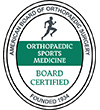Water on the Knee (Effusion) Causes and Treatments
Water on the knee is when fluid collects around and inside the knee joint, causing pain and swelling. Also known as knee effusion or fluid on the knee, it can occur whenever there's damage to the joint due to injury or underlying disease, such as arthritis.
What are hamstring rehab exercises?
Hamstring rehabilitation exercises can aid recovery and help prevent future injuries. Rehabilitation protocols typically call for a combination of stretching and strengthening movements.
5 Reasons Your Knee Still Hurts After Arthroscopy
Arthroscopic knee surgery is used to treat knee conditions, including cartilage injuries, meniscus tears, and ligament problems. Because it uses several small incisions rather than a large one, people tend to return to their activities more quickly and with less pain.
Baseball season is here: Watch out for UCL tears
Spring brings with it the joy of baseball, but too much of a good thing can lead to elbow injuries in young pitchers.
Shoulder-Strengthening Exercises
If you have pain in your rotator cuff, it may help to do shoulder strengthening exercises at home.The muscles that make up your rotator cuff can be prone to inflammation and tears if you do the same overhead motions too often.1 Making sure these muscles are strong enough is aAn important way to reduce tears or rotator cuff injury.
That pain in your leg could lead to more nagging pain in the future
According to one study, iliotibial band syndrome is one of the most common injuries in runners presenting with lateral knee pain, with an incidence estimated between 5% and 14%
Isometric Shoulder Exercises
Isometric exercise is a type of exercise in which you contract certain muscles without any other movement. A physical therapist may prescribe isometric shoulder exercises if you have pain or need to regain normal shoulder range of motion, strength, and/or mobility.
Both high- and low-dose exercise therapy found to be beneficial for knee osteoarthritis
Researchers from Karolinska Institutet have compared high dose exercise therapy versus low dose in patients with symptomatic knee osteoarthritis. The study published in the journal Annals of Internal Medicine show that both groups had similar results. However, high dose exercise therapy provided superior outcomes related to function in sports and recreation in the short term, with results subsiding after six months.
Best Anti-inflammatory Medications for Knee Pain
Knee pain can result from many conditions, including osteoarthritis, tendonitis, and sprains. These conditions can range in severity from a minor annoyance to disabling pain. Here are the best anti-inflammatory medications to help you obtain relief.
How Often Should You Work Out?
Regular exercise is part of a healthy lifestyle. But you might be wondering how much you should work out in a given week to get the most benefits.





